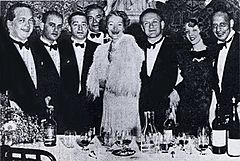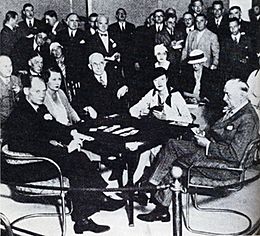Ely Culbertson facts for kids
Quick facts for kids
Ely Culbertson
|
|
|---|---|
| Born |
Elie Almon Culbertson
July 22, 1891 Poiana Vărbilău, Romania
|
| Died | December 27, 1955 (aged 64) Brattleboro, Vermont, USA
|
| Nationality | American |
| Occupation | Contract bridge writer, publisher, organizer and player; advocate of world peace |
| Spouse(s) |
Josephine Culbertson
(m. 1923; div. 1938)
|
| Children | 4 |
Ely Culbertson (born July 22, 1891 – died December 27, 1955) was an American expert at a card game called contract bridge. He was a very important person in the 1930s. Many people said he was "the man who made contract bridge" popular.
Ely was a great showman. He became very rich from the game. He also lost and gained his money many times. He helped make contract bridge a famous game around the world.
Contents
Ely's Early Life and Learning
Ely Culbertson was born in Poiana Vărbilău, Romania. His father was an American mining engineer. His mother was Russian. Ely went to universities in Paris and Geneva.
He was amazing at learning languages. He could speak Russian, English, French, German, Czech, and Spanish very well. He could also read five other languages. He knew Latin and ancient Greek too. Even with all his schooling, he mostly taught himself. He loved to learn on his own.
After the Russian Revolution in 1917, Ely lived in Europe for four years. He made money by playing card games. In 1921, he moved to the United States. He earned a living by winning at auction bridge and poker.
In 1923, he married Josephine Murphy Dillon in Manhattan. Josephine was a great teacher of auction bridge. She was also a top woman player. Together, they were very successful as players, teachers, and later as publishers.
Making Contract Bridge Popular
Over time, a new card game called contract bridge started to replace auction bridge. Ely Culbertson saw this as a big chance. He wanted to become the top leader of this new game.
Ely planned a huge and successful effort to promote himself. He was a player, an organizer, and a writer about how to play. He also edited a magazine. He was a key person in making contract bridge grow very fast in the 1930s.
Ely was great at getting public attention. He played in several famous challenge matches. He won all of them. These matches helped make his playing system well-known.
He founded and edited The Bridge World magazine. This magazine is still published today. He also wrote many newspaper articles and books about bridge. He owned a company that made the first plastic playing cards. He also started a group of bridge schools. These schools taught his special way of playing bridge.
Ely played high-stakes bridge games for many years. But he stopped playing in big tournaments in 1938. He wanted to focus on writing and working for world peace. He wrote important books like Total Peace (1943) and Must We Fight Russia? (1947).
Famous Bridge Matches
Ely's matches got a lot of attention. Newspapers often put them on the front page. By winning, Ely showed people that his way of playing bridge was better than others. This helped him sell many books.
However, one of his teammates, Theodore Lightner, said something interesting. He said Ely's team was much stronger than any other team. He believed they would have won easily no matter what system they used.
The Culbertson–Lenz Match
This match was played in New York City in late 1931 and early 1932. It was called the "Bridge Battle of the Century". Sidney Lenz led a group of players who did not like Ely's control of the game. They had their own system for playing.
Ely challenged Lenz to this match. He bet $5,000 against Lenz's $1,000. The money would go to charity no matter who won. The match involved playing 150 "rubbers" of bridge. Ely played most of these with his wife, Josephine. He also played with other top players.
Lenz played with Oswald Jacoby for most of the match. But Jacoby left after a disagreement about a play. Ely Culbertson won the match by 8,980 points.
A bridge expert named Terence Reese said that Jacoby was a much better player than anyone else in the match. Jacoby's risky bids helped keep Lenz's team in the game. But Lenz did not like Jacoby's playing style.

Matches Against British Teams
In 1930, Ely's team played against a British team in London. The British team used a system called "British Bridge." Ely's team won by 4,845 points over 200 games. Ely played with his wife, Josephine, and other top players.
Right after that match, Ely's team played another one against Crockford's Club. Ely's team won that match too, by 4,905 points.
In 1933 and 1934, more matches were played for the Schwab Cup. This trophy was given by Charles M. Schwab, an American who loved bridge. In 1933, Ely's team won by 10,900 points.
In 1934, Ely's team played against a very experienced British team. Ely's team won by 3,650 points. At one point, the British team was ahead by over 5,000 points. But they got tired, and Ely's team came back to win. This showed that even the great Culbertson team could be challenged.
Ely's team was finally beaten in 1937 in Budapest. This was in the first world championship for bridge teams. They lost to a team from Austria. This was Ely's last time playing in a tournament.
Bridge Achievements
Honors and Awards
In 1964, The Bridge World magazine honored Ely Culbertson. They named him one of the first members of a bridge hall of fame. Later, he became a founding member of the ACBL Hall of Fame in 1995.
- ACBL Hall of Fame, 1964
- ACBL Honorary Member of the Year 1938
Major Wins
Ely Culbertson won several important bridge tournaments:
- North American Bridge Championships (3 wins)
- Vanderbilt (1) 1930
- Asbury Park Trophy (now Spingold) (1) 1930
- Chicago (now Reisinger) (1) 1930
- Other important wins:
- Schwab Cup (2) 1933, 1934
Runner-up Finishes
He also came in second place in several big tournaments:
- IBL World Championship (1) 1937
- North American Bridge Championships (4 times)
- Chicago (now Reisinger) (2) 1932, 1935
- Life Master Pairs (1) 1930
- Fall National Open Pairs (1) 1928
 | DeHart Hubbard |
 | Wilma Rudolph |
 | Jesse Owens |
 | Jackie Joyner-Kersee |
 | Major Taylor |


